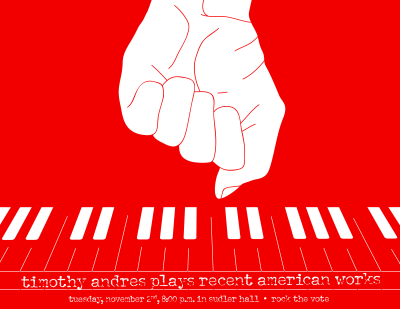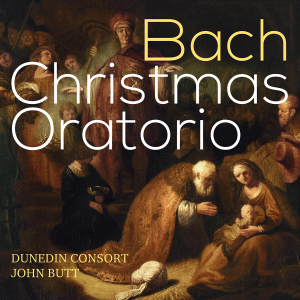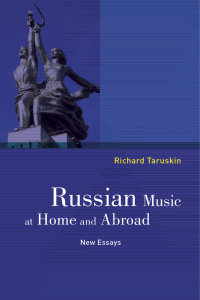Alex Ross's Blog, page 91
December 19, 2016
Miscellany
Image: Timothy Andres, 2004.
"Important things cannot be abbreviated": Steven Schick's program notes for an Inauguration Day concert at the San Francisco Contemporary Music Players are worth a read.... In the New York Times, Will Robin interviews female opera composers.... On the New Yorker website, Kerry O'Brien writes about the late, great Pauline Oliveros.... Make Music Winter reoccupies New York on Wednesday. The forecast looks clear and not too cold — surely a relief to baritone Chris Herbert, who will reprise his famous Winterize performance.... Incidentally, before Herbert took up singing full-time he worked as an analyst and P.R. person, specializing in Arabic matters; he speaks fluent Arabic. Go here to read about his astonishing experiences with Muammar Qaddafi and Donald J. Trump in 2009.... The composer Samuel Andreyev has a series of YouTube lectures on twentieth-century music. In one, he tackles the Boulez Second Sonata.... The Internet may be an increasingly sinister and noxious place, but it did give us All of Bach.... Longtime Noise friend Matthew Guerrieri has shepherded his Soho the Dog site to a new address. Read there a rich, discerning essay on the Chichester Psalms.... In El Niño at the LA Phil last weekend, Davóne Tines did most definitely "shake the heavens." I look forward to hearing more from this electrifying young bass-baritone. Is it too soon to utter the word WAGNER? The LA Times has a profile.... When Andrew Norman won the Grawemeyer for his piece Play, he constructively used the platform to call for more diversity in commissions. He elaborated his thoughts in at Musical America's annual awards ceremony.... Ethan Iverson reiterates an important message: click and share arts-journalism pieces if you don't want arts journalism to disappear.
December 15, 2016
Apex 2016
Sunrise at Mahogany Flat, Death Valley.
At the New Yorker website one may find my list of Notable Performances and Recordings of 2016. Some honorable mentions: Chris Kallmyer's Rhyolite, with Julia Holter and Lucky Dragons (Populist); Tchaikovsky's Violin Concerto and Stravinsky's Les Noces, with Patricia Kopatchinskaja and Teodor Currentzis conducting MusicAeterna (Sony); Gudmundsen-Holmgreen's Incontri, Mirror II, Symphony, and Antiphony, with Thomas Dausgaard conducting the BBC Symphony (da capo); ism, Ryan Muncy's recital of saxophone works by James Tenney and others (New Focus); Mozart's Piano Concertos K. 413-415, with Kristian Bezuidenhout and the Freiburger Barockorchester (Harmonia Mundi); Kurtág's complete quartets, with the Quatuor Molinari (Atma); Morton Gould: The Complete Chicago Symphony Orchestra Recordings (RCA); Haydn, Complete Symphonies (Decca).
The Rest Is Noise Person of the Year is Kaija Saariaho. The highest, hardest glass ceiling in American classical music has at last been broken (again).
My favorite music book of 2016 was Daniel Bergner's Sing for Your Life, the story of the fast-rising African-American bass-baritone Ryan Speedo Green. This is not only an extraordinary biographical and social chronicle but also one of the most perceptive behind-the-scenes classical-music books to have appeared in many years — all the better because Bergner isn't an insider, or at least wasn't one when he started. Tucked into the narrative are telling sketches of such cherished Met personalities (current and former) as Ken Noda, Brian Zeger, and Carrie-Ann Matheson. For more, see Anne Midgette's review for The Washington Post.
Other notable books on music: Ben Ratliff, Every Song Ever: Twenty Ways to Listen in an Age of Musical Plenty (FSG); Anna Beer, Sounds and Sweet Airs: The Forgotten Women of Classical Music (Oneworld); Renée Levine Packer and Mary Jane Leach, eds., Gay Guerrilla: Julius Eastman and His Music (University of Rochester Press); Fiona Maddocks, Music for Life: 100 Works to Carry You Through (Faber); Jennie Gottschalk, Experimental Music Since 1970 (Bloomsbury); Laura Kuhn, ed., The Selected Letters of John Cage (Oxford); Michael Marissen, Bach & God (Oxford); Jack Hamilton, Just Around Midnight: Rock and Roll and the Racial Imagination (Harvard); Richard Taruskin, Russian Music at Home and Abroad (University of California); Marina Frolova-Walker, Stalin's Music Prize: Soviet Culture and Politics (Yale); Virgil Thomson, The State of Music & Other Writings, ed. Tim Page (Library of America).
As in past years, I will tax the forbearance of even the most inured readers by selecting a few highlights outside my realm of nominal competence. Amid the endless Wagnerism reading — Of Lena Geyer, anyone? — I enjoyed A. O. Scott's Better Living Through Criticism, Edna O'Brien's The Little Red Chairs, Geoff Dyer's White Sands, Alex Abramovich's Bully, and Jeffrey Toobin's American Heiress. I didn't see enough movies or hear enough pop music to render meaningful judgments in those areas, but I still love Radiohead and am looking forward to Moonlight. On television, the two big O. J. Simpson projects — the American Crime Story dramatization and the Made in America documentary — were both remarkable. The Man in the High Castle proved to be more relevant than anyone wanted. Sanity was maintained by Samantha Bee.
December 12, 2016
A Lourié moment
Richard Taruskin's remarkable essay on the exiled Russian composer Arthur Lourié (1892-1966) in Russian Music at Home and Abroad has sent me on a detour through the elusive, at times enigmatically potent world of Lourié's music. Posterity remembers him best as one of Stravinsky's many intellectual sidekicks and amanuenses; his 1928 essay "Neogothic and Neoclassic" set up the Stravinsky-Schoenberg dichotomy that long animated (and distorted) discussion of principal twentieth-century trends. There is, however, a great deal more to Lourié than that, from his early Futurist pieces — including experiments in atonality and microtonality — to his brief reign as a radical Bolshevik functionary and on to various adventures in the West. A three-disc survey of Lourié's piano music just appeared on Capriccio, with Moritz Ernst at the keyboard; the highlight is the 1915 piece Formes en l'air, with its visionary free-floating notation. I also went back to Gidon Kremer's recording of the Concerto da Camera, whose wry, melancholy neoclassicism anticipates Schnittkean polystylism, and to haunting choral works on an old Le Chant du Monde disc. What I'd most like to hear, though, is a first-rate rendition of Lourié's Concerto Spirituale, whose score is online at Boosey. Taruskin discusses it at fascinating length, noting the possibility that its cool sacred sonorities influenced Stravinsky's Symphony of Psalms. The bootleg YouTube video above, apparently from a 1995 Deutsches Symphonie-Orchester Berlin concert with Gennady Rozhdestvensky conducting and Viktoria Postnikova at the piano, is all but unlistenable, but it gives a tantalizing hint of what might be Lourié's masterwork.
December 10, 2016
None is the number
In the end, after all that fuss, Bob Dylan accepted the Nobel Prize for Literature in uncommonly elegant fashion — with considerable help from Patti Smith, above. His speech, delivered vicariously, is here.
Previously: Bob Dylan as Richard Wagner.
December 5, 2016
Adorno FTW

The Frankfurt School Knew Trump Was Coming, on the New Yorker website.
December 4, 2016
Opera in LA
Pyramids and WikiLeaks. The New Yorker, Dec. 12, 2016.
November 30, 2016
Nightafternight playlist
New releases of interest.
— Bach, Christmas Oratorio; John Butt leading the Dunedin Consort (Linn)
— Bach, French Suites; Murray Perahia, piano (DG)
— Bach, Partitas; Jory Vinkour, harpsichord (Sono Luminus)
— Mozart, Don Giovanni; Dimitris Tiliakos, Vito Priante, Mika Kares, Myrtò Papatanasiu, Kenneth Tarver, Karina Gauvin, Teodor Currentzis conducting Musicaeterna (Sony)
— Gudmundsen-Holmgreen, Incontri, Mirror II, Symphony, Antiphony; Thomas Dausgaard conducting the BBC Symphony (da capo)
— Dante Boon, clarinet (& piano): O'Hare, 3x, Wolken/veld; Jürg Frey, clarinet, Boon, piano (another timbre)
— Michael Pisaro, the earth and the sky: piano works; Reinier van Houdt (erstwhile)
— Marti Epstein, Hothouse, Grand Island, A Little Celestial Tenderness, Hypnagogia; Ludovico Ensemble (Ludovic0)
— Lourié, Solo Piano Works; Moritz Ernst (Capriccio)
— Ginastera, Panambí, Piano Concerto No. 2; Juanjo Mena conducting the BBC Philharmonic, with Xiayin Wang, piano (Chandos)
November 29, 2016
Bookshelf
New and recent publications of interest.
Richard Taruskin, Russian Music at Home and Abroad (University of California)
R. Howard Bloch, One Toss of the Dice: The Incredible Story of How a Poem Made Us Modern (Liveright)
Christopher Fifield, Hans Richter (new edition) (Boydell)
Russell Hartenberger, Performance Practice in the Music of Steve Reich (Cambridge)
Steven Johnson, Wonderland: How Play Made the Modern World (Penguin)
Peter Williams, Bach: A Musical Biography (Cambridge)
November 28, 2016
Norman's Grawemeyer
Andrew Norman has won the 2017 Grawemeyer Award for Music Composition, for his formidable symphonic piece Play. In an interview with NPR, he has an exceptionally thoughtful reaction to the prize: "Maybe I can use this moment to talk about things that are important to me. Like to call attention to the fact that there are problems. For instance, this award has been given to three women out of its 30-year history. And to me that's kind of an issue. And in all honesty, I'm a white man and I get lots of commissions and there are systemic reasons for that, reasons we should all be talking about. There are so many talented composers out there. Rather than giving me another commission, why aren't we giving those people a commission?" Norman has also been named Musical America's . I was asked to write a short essay for the occasion.
November 25, 2016
For Pauline Oliveros
The experimental master has died at the age of eighty-four. Listen again to I of IV, preferably at immense volume.
Alex Ross's Blog
- Alex Ross's profile
- 425 followers







